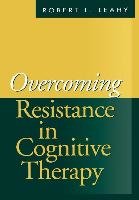Despite the efforts of therapists and patients, many patients in cognitive-behavioral therapy--or any therapy--do not improve. This unique book is designed to help the clinician better understand and work with patients who seem unable or unwilling to make needed changes. Integrating ideas from a range of psychotherapeutic approaches, the book presents a multidimensional model of resistance. It enumerates the specific impediments to change that may arise in the cognitive therapy context and brings each one to life with realistic clinical illustrations. Clinicians learn practical strategies and interventions to deal with a number of types of resistance, from reluctance to comply with basic cognitive procedures to risk-aversion and self-handicapping. Also addressed are countertransference issues, including workable ways that clinicians can modify their own responses to patients to overcome impasses in treatment.


